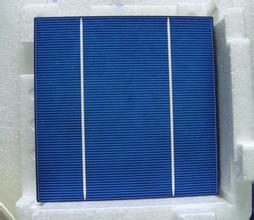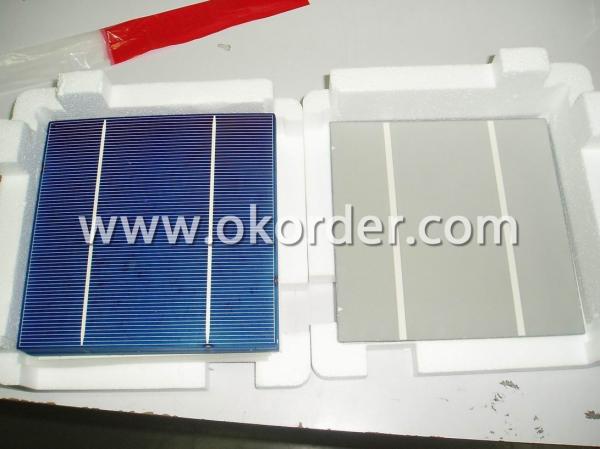Loading Port:Tianjin
Payment Terms:TT or LC
Min Order Qty:40000 watt
Supply Capability:1000 watt/month
Details Of Poly Solar Cell 156mm
Specifications Of Poly Solar Cell 156mm
1.Mechanical data and design
Format | 156 mm × 156 mm ± 0.5 mm |
Thickness | 210 μm ± 40 μm |
Front(-) | 1.5mm bus bars (silver),blue anti-reflection coating (silicon nitride) |
Back (+) | 2.5 mm wide soldering pads (silver) back surface field (aluminium) |
2.Temperature Coefficient of Cells
Voc. Temp . coef.%/K | -0.351%/K |
Isc . Temp . coef.%/K | +0.035%/K |
Pm. Temp. coef.%/K | -0.47%/K |
3.Electrical Characteristic
Efficiency (%) | Pmpp (W) | Umpp (V) | Impp (A) | Uoc (V) | Isc (A) | FF (%) |
17.25 | 4.197 | 0.524 | 7.992 | 0.62 | 8.458 | 80.03% |
17 | 4.137 | 0.524 | 7.876 | 0.619 | 8.353 | 80.01% |
16.75 | 4.076 | 0.522 | 7.81 | 0.617 | 8.286 | 79.73% |
16.5 | 4.015 | 0.518 | 7.746 | 0.613 | 8.215 | 79.73 |
16.25 | 3.955 | 0.515 | 7.683 | 0.61 | 8.144 | 79.61% |
16 | 3.894 | 0.512 | 7.613 | 0.608 | 8.075 | 79.31% |
15.75 | 3.833 | 0.51 | 7.534 | 0.605 | 8.058 | 78.62% |
15.5 | 3.772 | 0.508 | 7.453 | 0.604 | 8.02 | 77.87% |
15.25 | 3.771 | 0.505 | 7.35 | 0.604 | 9.997 | 76.83% |
15 | 3.65 | 0.503 | 7.271 | 0.604 | 7.989 | 75.64% |
14.5 | 3.529 | 0.499 | 7.067 | 0.604 | 7.988 | 73.14% |
14 | 3.407 | 0.499 | 6.833 | 0.604 | 7.833 | 72.01% |
4.Intensity Dependence
Intensity [W/m2] | Isc× [mA] | Voc× [mV] |
1000 | 1.00 | 1.000 |
900 | 0.90 | 0.989 |
500 | 0.50 | 0.963 |
300 | 0.30 | 0.939 |
200 | 0.20 | 0.920 |
Advantage Of Poly Solar Cell 156mm
1: High quality cell, Level A cell (14%—17.5%)
2.Dimensione:156*156mm Diagonal:200mm
3: Qualified certification: TUV,CE certification.
4: Warranty: five years for whole unit
Usage/Application Of Poly Solar Cell 156mm
Packaging & Delivery Of Poly Solar Cell 156mm | |
Packaging Detai | Packaging Detail:Export Carton and Pallet or under customer request. |
Delivery Detail:10-20days | |



Latest research progress of Polymer Solar Cells
Compared with mature inorganic silicon solar cells from its conversion efficiency and stability, Polymer Solar Cells is still in the development stage. However, due to the advantages of having a light weight, low cost, flexible devices can be made, and a wet film formation (spin coating, ink jet printing and screen printing) technology and other large area, the organic polymer solar cells become one of the hottest areas of research.
Photoelectric conversion efficiency of solar cells is determined by the open-circuit voltage of the battery, short-circuit current, and fill factor, so how to improve the aforementioned three factors, the conversion efficiency of solar cells is a key factor in increasing.
A joint research team from the University of California and the University of Cambridge consisting proposed PIPCP in recent journal Advanced Materials: PC61BM conjugated polymer ─ fullerene heterojunction solar cells latest research body, proposed a lifting battery open circuit voltage the method can significantly improve the photoelectric conversion efficiency of the device.
The paper pointed out that when the organic material absorbed photon excited state is formed, the excited state is seen as the static electricity in a combination of electrons and holes, known as excitons. Since the exciton properties of the organic semiconductor, the driving force of the charge separation in a solar cell is the donor and acceptor materials, the energy difference. Electronic circuit voltage depends on solar photovoltaic bandgap and bandgap is the recipient of the lowest unoccupied molecular orbital (LUMO) and to the body between the highest occupied molecular orbital (HOMO) energy difference.
Receptor lowest unoccupied molecular orbital wave function of the body and to the highest occupied molecular orbital overlap between the interface can create a form, this interface morphology and related electronic open-circuit voltage, called the charge transfer state (CTS). In fixed offsets, energy and electronic charge transfer state open circuit voltage linear relationship, even with the temperature close to the same value obtained when 0K, which shows the energy charge transfer state may limit the open circuit voltage of the electron. By reducing energy loss in the electronic band gap to the open circuit voltage, can effectively enhance the photoelectric conversion efficiency of the organic polymer solar cell.




